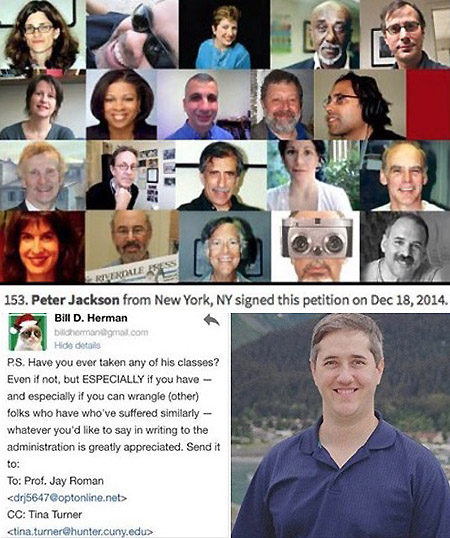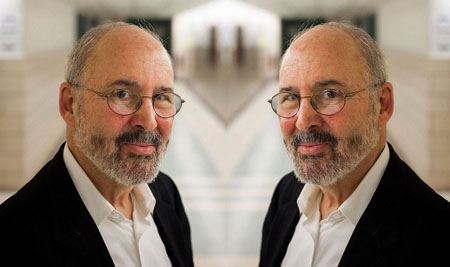I lead with my reply to the reply of Mr. Buddy Stein, a former D:F/M instructor, about comments I made about the awards on the #D:F/M listserv known as fm-l. We have crossed swords before. As I recall, one swashbuckling involved the word carpetbagger. And another involved his role as member of a grade appeals committee indulged in serious academic hanky-panky regarding the awarding of a passing grade to a student who had failed a class for cheating.
[Editor’s Note: Typos, errors have been corrected. Blog post updated April 8, May 3.]
The following addresses comments in Mr. Stein’s reply, which is provided at the end.
1) Professor Morris has never questioned the quality or talent or selection of any student for the Aronson Student Awards. Never. Early on I championed the student awards in the face of resistance (I was not the one insisting that students should be seen at the rewards accepting the check but not to be heard). Also, I know of no selected student who didn’t deserve his or her Aronson. I write this for clarification in the event that any criticism or critique in my first post may have been misread or misinterpreted or misrepresented as questioning this year’s student winner, whom Mr. Stein identified as “Ahjani Ayers.”
Professor Morris’ qualms were directed at the selection process. Professor Morris now has a qualm directed at Mr. Stein.

Stein
I had a very good student in a class a while back and worked with her as she was applying for an internship with a Connecticut newspaper as well as tried to mentor her with other interests of hers (in a department that doesn’t do much if any mentoring). Her name was spelled, correctly, Ajhani A. Ayres (not Ahjani Ayers). Her friends know her as AJ. I assume Mr. Stein knows what can be and is said in journalism circles – that includes classrooms – about journalists, former journalists and former journalism instructors who can’t spell names correctly.
2) I believe my first post accomplished my mission and confirmed my suspicions. I won’t be elaborating on any of them in this post, though I have to say that even in retirement Mr. Stein continues to blow great plumes of smoke. I am sure his blarney is missed in my department, especially for grade appeals. Does Mr. Stein not recall his role in the Four Barnacles of the Apocalypse D:F/M Grade Appeals Committee?
3) Mr. Stein’s quip about social justice journalism, as he recalled his comment in a dated article in the Clarion published by the CUNY faculty union, the Professional Staff Congress, is too self-serving for my tastes and contributes nothing to real discourse of social justice journalism and advocacy journalism that would be a benefit to students. As I said, it’s a quip, yet, Mr. Stein wants it regarded as a reflection of solomonic wisdom because it was printed in an union newspaper? James Aronson, obviously, would have supported any journalism effort that valued “the lives of ordinary people” but self-serving solipsism, I like to imagine, would have been too much for him. [Jesus Christ! Mr. Stein, it’s the Clarion].
4) I stopped attending Aronson ceremonies long ago because of the artifice and burgeoning smoke plumes substituting the substance and significance and grace that the awards once had. It was becoming obvious then and even more obvious now, that a Vanity Journalism Boutique was in the works, with program directors who supported news censorship. James Aronson never supported news censorship. He also, as I like to imagine, would have been unhappy with the creep of insipid journalism curriculum into an undergraduate journalism effort he tried to nurture.

5) I associate with and hangout with and network with numerous journalists, journalism organizations and journalism teachers (though not on this campus, regarding the latter) and so I see no need to attend the Aronson awards to get inspiration. When I have encountered students whom I believe might benefit from more inspiration than I can provide, and who may benefit from witnessing and experiencing the workings of a respected journalism awards ceremony, I contact Colleagues at the Polk Awards regarding admission, Colleagues at the Dart Awards at Columbia University and I use to be in contact and work with the Ippies (about ethnic journalism news contributions; ethnic journalism doesn’t get much attention on this campus which is suppose to be one of the most culturally and ethnically diverse of the CUNY four-year colleges).
6) There have been several WORD articles over the years about the Aronson Awards and the student journalists have expressed their opinions about the event. Mr. Stein made a referral to a WORD article that seemed to have been upbeat about the Aronsons. So what? Other articles haven’t been as kind. So what? In fact, one was downright nasty. So what?
7) Regarding Mr. Stein’s referral to “Hunter’s fine journal program,” it had promise years before Mr. Stein commenced his brief tenure in D:F/M, an appointment originally opposed by Colleague Stuart Ewen and erstwhile Colleague Peter Parisi, so much so that the Administration contacted me [via my department chair when we were on speaking terms] to write a letter endorsing Mr. Stein to counter the parliamentary stratagems of Ewen & Parisi.
I gloat: I wrote a great letter (and have no regrets even now about the inevitable disappointment at each word in that letter) that helped secure Mr. Stein’s appointment. Nevertheless, the journalism effort’s nosedive into the abyss seemed to coincide with the arrival of Colleagues bearing Pulitzer Prize epaulets. I thought maybe that was one of the reasons why Mr. Stein departed. There are species who bail when a ship starts sinking.
8) One of the signs of the decline is reflected in the teaching quality of the news writing classes. As Mr. Stein knows, writing is about rewriting. To be blunt, the department has had three instructors with Pulitzer Prize epaulets and they all turned up their noses up at the task, despite the importance of teaching students that writing-means-rewriting. For years, I’ve been getting students enrolling in my advance news writing classes who have been poorly prepared because they were never taught that writing involves rewriting nor were they taught the importance of interviewing. Something is going on in the basic writing classes and Neighborhood News class that wouldn’t be occurring, to borrow Mr. Stein’s comment, in a “fine journalism program.” But the Mr. Blarney-s of the world are free to call it as they see it.
[Neighborhood News is a class started several years ago by Mr. Stein. Undergraduate and graduate students in the perennially under-enrolled class supposedly write stories and take pictures and video for the Hunts Point Express. There is also a second newspaper started by Mr. Stein. I don’t recall its name at this writing. I would be surprised if either one will be publishing in the near future.]
9) Regarding D:F/M, there has been a noticeable reduction in the stats that I and others (in other undergraduate j-efforts) use to evaluate an undergraduate program (D:F/M really doesn’t have an undergraduate journalism program, it has had an effort and not a particularly good one). As the stats show the decline, the blarney, malarkey and smoke & mirrors have climbed preposterously.
10) As for the Neighborhood News class, the neverending department and institutional effort to prop it up to make it look like something it isn’t continues at this date. And so it goes.
11) As the smoke plumes blow, so does the program. Etcetera.
Professor Gregg Morris
End of Part 1

________________________________________
From: Bernard Stein
Sent: Monday, March 28, 2016 11:18 AM
To: Greggory w Morris; FM-L@HUNTER.LISTSERV.CUNY.EDU
Subject: RE: Aronson award
I’m not just Mr. Morris’s former colleague; I’m his retired colleague. I have no connection to or knowledge of the workings of the Aronson committee. His questions about the number of entries and runners-up should be addressed to it, not me, but I agree with disclosing them. However, even if it turned out that this year’s undergrad winner Ahjani Ayers was the only student to enter, I would continue to think her work is worthy of recognition. You can decide for yourself by reading it at http://brie.hunter.cuny.edu/hpe/2015/05/28/watching-the-block-three-women-look-back-and-ahead-on-kelly-street-2/
I was going to agree, too, with Mr. Morris’s observation that the identities of the judges should be disclosed, but then I did what even superannuated journalists do: I checked. They are. Their names and short bios are on the Aronson website http://brie.hunter.cuny.edu/aronson/
A couple of years ago, the Clarion interviewed that year’s student Aronson winner Angely Mercado, now at the CUNY j-school. She published a series on the efforts of tenants to force their landlords to maintain their buildings in Hunts Point and Longwood, the South Bronx neighborhoods covered by The Hunts Point Express. The Clarion asked me about social justice journalism, and I replied, “I think community news that vaules ordinary people and their lives is by its very nature social justice journalism.” That’s of course not an all-encompassing definition. Perhaps Mr. Morris and others who continue to teach in Hunter’s fine journalism program have already consulted the just-released guide, described by the Pulitzer Prizes as “a vast online archive of Pulitzer Prize-winning work on Social Justice and Equality.” Or they can look back at the work of past Aronson winners, easily available on-line for superb examples.
I’m don’t know whether Mr. Morris has been to an Aronson Award event recently, but I think he would find it inspiring to hear the award winners—professionals and students alike–affirm that in a time of disruption and cutbacks in journalism, reporters still produce meaningful investigations that make a difference in the lives of their audiences and in ours. Certainly his student reporter found the event inspiring last year when she covered the event for The WORD, the news site where my former colleague’s students publish their work.
I’ll go back to polishing my epaulets now. I’d like them to shine by April 19 when I return to Hunter to hear from this year’s winners.
Bernard L. Stein
________________________________________
From: Hunter College Film and Media Studies [fm-l@hunter.listserv.cuny.edu] on behalf of Greggory w Morris [gmorris@hunter.cuny.edu]
Sent: Monday, March 28, 2016 9:08 AM
To: FM-L@HUNTER.LISTSERV.CUNY.EDU
Subject: Re: Aronson award
Along with his expression of pride, the former Colleague with the Pulitzer Prize epaulets should provide transparency for fm-l students for such things as how many students competed in the competition (helps gives scope), who was on the selection committee (always important + it adds scope) and perhaps why runner-ups weren’t mentioned, that is, if there were runner-ups. He might also mention the importance of transparency to the honchos running Aronson this year about their selection committee (if there is one), selection process (if it’s in writing), etcetera.
I know there are concerns about transparency in this department but it is a buzz word for journalism aficionados and should be for those who purport to be journalism aficionados.
Since the notice was posted to fm-l, maybe the former Colleague with the Pulitzer Prize epaulets could also provide student members of the fm-list some info about social justice journalism since social justice journalism and advocacy journalism are rarely, if ever, formally mentioned or described in any courses or included in the usual discourse in the department and appears to only come up as a topic when some aspect of the Aronson’s Awards is announced.
I suggested this idea a long time ago to erstwhile Colleague Peter Parisi, when it appeared that the Aronson Awards was running on empty in terms of energy and direction and substance. I assume Colleagues involved with the A-Awards wouldn’t want students to believe that the A-Awards are merely an exercise in vanity journalism. Since student attendance (required and otherwise) has traditionally helped shore up attendance at Aronson Awards ceremony to make it seem more respectable than it really was, more info to them seems reasonable.
Also, those subscribed to this list should never forget: James Aronson never supported news censorship.
Best,
Gregg Morris
________________________________________
From: Hunter College Film and Media Studies [fm-l@hunter.listserv.cuny.edu] on behalf of Bernard Stein [bstein@hunter.cuny.edu]
Sent: Friday, March 25, 2016 12:37 PM
To: FM-L@HUNTER.LISTSERV.CUNY.EDU
Subject: Aronson award
Proud of Ahjani Ayers, winner of the undergraduate Aronson Award for Social Justice Journalism for her work in The Hunts Point Express, the community newspaper of Hunts Point and Longwood in the South Bronx, which is staffed by students in the Neighborhood News class. Here’s a sample of her work: http://brie.hunter.cuny.edu/hpe/2015/05/28/watching-the-block-three-women-look-back-and-ahead-on-kelly-street-2/
Bernard L. Stein